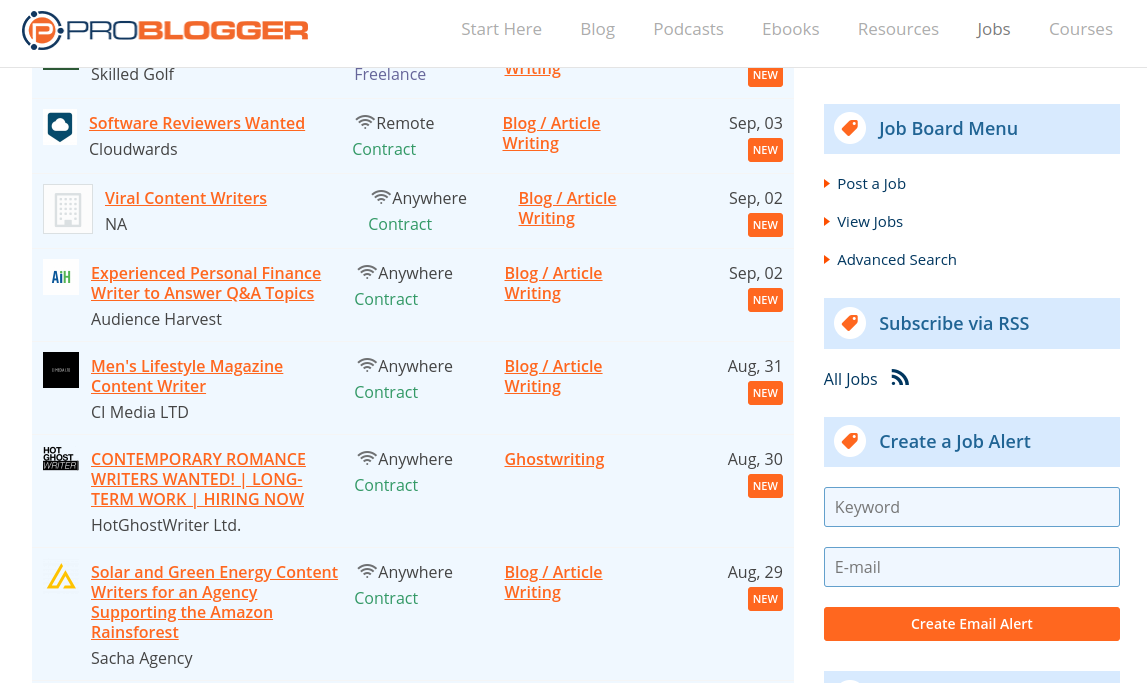How to score online entry-level writing jobs (with no experience) in 2022
Every freelance writer has to start somewhere.
Scoring that first entry-level writing job online is one of the hardest parts of kickstarting a career as a freelance writer.
But it's also a chicken and egg situation. A lot of writing jobs (even entry-level ones) ask to see a portfolio of your work or previous experience before they'll hire you.
And without experience, you can’t get the job. Right?
Well, yes and no. As a freelance writer, I’ve come to realise that these prerequisites don't matter all that much. And there are ways to score entry-level writing jobs, without a portfolio or experience writing online.
This article is going to show you:
Where to look for entry-level writing jobs
How to spot a good writing job (and a bad one)
How to pitch for entry-level writing jobs
Ready? Let’s dive in
Where to look for entry-level writing jobs
I like to think that any job that's posted on a job board is considered entry-level. I believe they are fair game.
But not all job boards are made the same. I’m a firm believer in ditching the content mills (UpWork, Guru.com, Fiverr) as they only bring about super low-paying gigs, and end in writer burnout.
The problem with low paying gigs
Other than the fact that they're low paid? Well, they're normally one-offs. That means after you finish one, you need to start searching for another gig. And then continue the cycle until you burn out and give up on freelance writing forever.
Luckily, the better paying the client, the more willing they normally are to give you a regular gig. Better paying clients tend to see writing as an investment in their business. For example, let's say a company hires you to write for their blog. Chances are, they need more than one blog post (unless they have no idea how content marketing works), so it makes sense for them to keep giving you work if they like your stuff.
This is why I’ve personally never applied for gigs that have a lifetime of one invoice. Once you get into freelance writing, you’ll find that a lot of gigs take a lot of admin work before you even get started. You have to talk to the client (there’s a lot of emailing and Skype calls), and back-and-forths about a project before you get started. If you have to do this every time you start a new project, you’ll burn out and give up. I guarantee it.
Just because you’re starting out as a freelance writer doesn’t mean you need to get paid pennies. Here are a couple of the best sites to find gigs that will pay you more than peanuts.
1. ProBlogger
Problogger’s Job Board is an excellent place to search for entry-level writing gigs.
First off, businesses have to pay to advertise their jobs on the site, so it cuts out a lot of the scamming that's associated with freelance job boards. Plus, the gigs are broken down into categories like "freelance" and "contract", along with if the company is after a blog writer, ghostwriter, or an editor.
Like any freelancing job site, some of the clients advertising are offering up pennies, like this guy:
Before you get too excited and screech $50 an article! What’s wrong with that?... Let’s do the math. 1500 words/$50 = 3 cents a word. Now that’s peanuts.
Thankfully, a lot of clients are willing to negotiate on rates depending on the quality of our writing, so don’t be put off if a client doesn’t advertise their rates.
Pro-tip: Create a job alert so you’ll be sent new postings as soon as they’re listed. I’ve found that the earlier you apply, the better. Along with a good pitch of course, but we’ll get to that a bit further on.
2. BloggingPro
The job board over at BloggingPro is another site that charges for listings.
I’ve found that the Blogging Pro job board is a little less active than ProBlogger, but the clients are of a higher standard and are willing to pay a decent rate for writers.
Other sites you can use are:
WorkingNotWorking (you have to apply here, it's members-only)
Indeed (I’ve also landed some great clients on Indeed)
How to spot a good writing job (and a bad one)
One of the biggest new writers have is the feeling that they need to earn their stripes. You know, take on really crappy paid gigs because they’re just starting out and need the experience.
Stop. Right now.
What's the use of getting experience from bad clients who pay you badly? Chances are, they won't be worth much when you try and get a referral, and they will ask you to go above and beyond for literal pennies. Like this:
When you’re looking for a writing job, it’s important to dissect a job post and see what exactly they’re going to want from you. This is important because even if a job has a decent price tag, if a client is asking for a ton of stuff upfront, it may not be worth the hassle of taking the gig on.
Now, let’s dissect the above writing job:
3000+ words
$20 (or less)
Premium content
Excellent Search Engine Optimisation (SEO)
Firstly, to research an article that’s 3000 words, it will take at least a couple of hours (to get it to a “premium” level). Next, unless the client does the SEO work for you, that’s an add on. Most of the “better” clients in the content writing game will either provide you with keywords, a rough article outline, or both.
Why? Because SEO is a skill in itself. And anybody who wants to pay 0.006 cents a word for premium, SEO driven content is on another planet.
This is a bad writing gig. Now, let’s find a good one.
This post has potential, so let’s dissect it:
1-2 articles a week (with room to grow, so no one-off gig burnouts)
Good pay (but they don’t say what it is, so there’s room for negotiation)
Flat rates (writing per word or per hour is the hardest way to make money freelancing)
They're legit (400k monthly views mean the site is most likely generating advertising traffic, so you'll get paid)
If you don’t know much about finance or you don’t have a portfolio, this gig may seem daunting. But there are a few ways you can pitch and land this gig, even without any experience.
WANT FREELANCING TIPS STRAIGHT TO YOUR INBOX? SIGN UP HERE!
How to pitch for entry-level writing jobs
Scoring entry-level writing jobs is all about faking it 'til you make it, so to speak. Even without a single article in your portfolio, you can still get the financial content writer’s job above.
But how? Well, make it easy for them to pick you as the writer they need on their team.
Step #1: Do your research
The above job ad was for a blog called “The Ways to Wealth”, so the first thing you should do before applying for the role is to go to the website and check them out.
I’ve been told numerous times from clients I've successfully pitched that it was clear that I made an effort to look around at their site and see what type of content they’re looking for.
Back to the pitch. From the potential client’s homepage and blog, you should be able to get a feel for what they’re looking for, content-wise.
Already I can see that they’re writing content about:
Making money
Saving money
Earning money online
Their content is written in listicles (you can check out what that means here)
Keeping this in mind, it’s time to build a piece of content of your own for the pitch, in place of a portfolio.
Step #2: Write a teaser article
Now that you’ve got an idea of what kind of content they’re after, the best way to pique the potential client’s interest is to write a teaser article.
A lot of content writers won’t do this, as it requires a little effort and there is no guarantee that you’re going to get the job at the end. But, if you do build out a piece of content and you don’t get the job, keep in mind that you can use it for another job pitch in the same field.
But writing a teaser article does a few things:
It saves your potential client sifting through your portfolio pieces to try and figure out what your writing capabilities are
It shows your client that you’ve not only looked at their website, but you’re already starting to find ways to add value to their content
It shows initiative: as you can see from the above email, the client advertising on ProBlogger was impressed that I had clearly made an effort to see what the company was about before applying. Don't think that potential clients can't smell a copy+pasted email from a mile away. Put a bit of effort into your pitches.
For the teaser article, you could write something like "10 best ways to make money from blogging". It fits with their content flow as well as their article styles. Next, head over to Google and type in "ways to make money blogging":
Start researching and making a list of dot-points of how people can make money from blogging. Remember, this is a taster piece, so you don’t have to go wild (500 words will do). Add in an introduction and a conclusion, and you’re set.
Just because this is a taster piece doesn’t mean you can get lazy. This piece will act as a starter for your potential client; it should show them what you’re capable of if they end up hiring you. If your taster piece is sloppy, it will show you as a lazy writer, and you won’t get hired. End of.
Step #3: Write the perfect pitch
When you’re applying for writing jobs, remember… the application has got nothing to do with you.
At the end of the day, the businesses posting on these job boards have a problem (they need a writer), and they need somebody to solve it (you). So, all you have to do is connect the dots. The worst thing you can do when you're pitching is to go on and on about yourself, but never mention the client and their problem, like this guy:
Instead of talking about yourself, you want to make it clear that you’re up to the job, and you know how to solve their problem. Like this:
I clearly went a bit overboard writing 1100 words, but this pitch worked, and I ended up working with this client for several months until I started to scale my business.
Getting entry-level writing jobs is easy if you make it about the client
There's a particular science to getting your first freelancing clients.
It might seem impossible. You don't have any experience (at least writing for blogs or in content marketing), you don't have a portfolio, and you don't even know where to start. But hopefully, this guide will give you a headstart on where you should be looking (and pitching).
My advice is to never settle for content mills and always aim to get higher-paying clients right from the start of your freelancing career. With poorly-paying clients, not only is your work undervalued, but you'll burn out.
Pitch smarter and pitch for the right clients. You’ll be building your own portfolio in no time.










